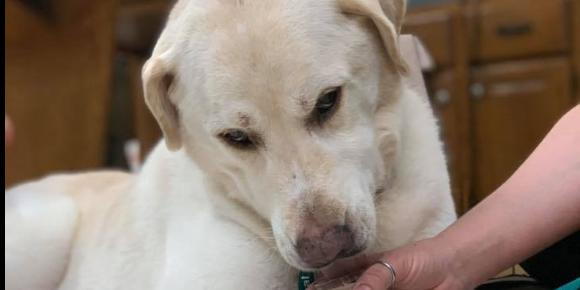
- posted: Aug. 10, 2020
- Doctor's Notes
What is Arthritis?
The definition of arthritis is the inflammation of joints. Arthritis can be caused by such a wide variety of conditions immune-mediated disease, infection, metabolic issues, and trauma. Degenerative changes from overuse, age, and problems with development are the most common forms of arthritis.
While arthritis is not picky about who it is affecting, there are certain factors that play a part in increasing the dog’s risk. Large breeds such as Labradors, retrievers, and German Shepherds are more likely to suffer from arthritic pain. Dogs that are overweight and older dogs are also more likely.
Types of Arthritis seen in Dogs:
Osteoarthritis, or Degenerative Joint Disease (DJD): This is the deterioration of cartilage that covers joints over a long period of time. The cartilage job is to allow your pet joints to move in pain-free motions, once that cartilage becomes inflamed and worn down your pet will start to experience pain.
Hip Dysplasia: This is the developmental malformation of the hip joint. Due to misalignment, often chronic inflammation occurs in the joints. Dogs with hip dysplasia have the option of various procedures, and medication to help alleviate the pain that comes along with it.
Elbow Dysplasia: this occurs when the bones do not develop normally due to a hereditary issue. This causes misalignment and will lead to cartilage damage and possible bone chipping. Larger breed dogs are most commonly affected, and surgery can be used to correct this.
Knee Dysplasia: Smaller dog breeds, like toy breeds, often will have their knee joints malformed. Just like with hip, and elbow dysplasia this defect will cause arthritis. It is common for the kneecaps to pop in-and-out of place, this is referred to as a luxating patella. Until the knee is returned to place the dog will limp, surgery is required to correct this.
Signs and Symptoms:
Arthritis ranges from mild, to severe. Every pet is different and yours might experience different symptoms based on the severity of their arthritis.
Symptoms often include:
-Whining, whimpering, or panting
-Licking of the joint area
-Slow to stand up
-Not wanting to jump, walk, or climb stairs
-Depression and irritation
-Accidents in the house
-Popping and cracking of joints
-Loss of appetite or weight gain
-Muscle wasting
-Lameness
-And swollen joints
Treatment and Diagnosis:
To treat arthritis a comprehensive and thorough exam will be done. Motion tests and movement observations will be done.
Possible additional testing may be needed, such as:
-Radiographs of the back and joints.
-Thyroid test
-Antibody testing to check for tick-borne diseases
-Full blood chemistry
-Urine tests to test for UTIs, other bladder diseases, and kidney levels.
Once diagnosed, your veterinarian will recommend a treatment plan based on your pet's needs, and pain levels. These often include:
-Anti-inflammatory medications
-Dietary management
-Supplements to lubricate the joints and repair the cartilage
-Surgery for various types of dysplasia
-Acupuncture and Cold Laser therapy
Often, once your pet is put on an anti-inflammatory, your veterinarian will recommend annual bloodwork and urine monitoring to stay on top of your pet’s tolerance to the medication.
Prevention:
While not always preventable, reducing the risk is easy with low-impact exercise, proper diet, and weight management. It is important to reach out to your veterinarian if you suspect your pet might have joint pain. Reducing the risk and the severity of this disease is important for a long healthy, and pain-free life.
Location
Find us on a map
Tulsa Office
7811 E 71st St A
Tulsa, OK 74133, United States
Office Hours
Tulsa Office
7:30 am - 7:00 pm
7:30 am - 7:00 pm
7:30 am - 6:00 pm
7:30 am - 6:00 pm
7:30 am - 6:00 pm
8:00 am - 6:00 pm
Closed
Broken Arrow Office
7:30 am - 6:00 pm
7:30 am - 6:30 pm
7:30 am - 6:00 pm
7:30 am - 6:30 pm
7:30 am - 6:00 pm
8:00 am - 6:00 pm
Closed
